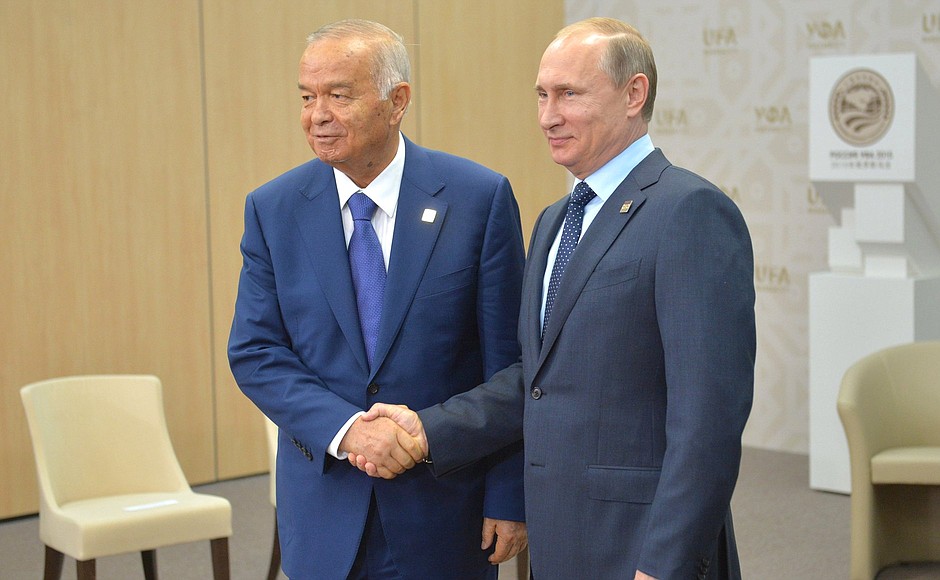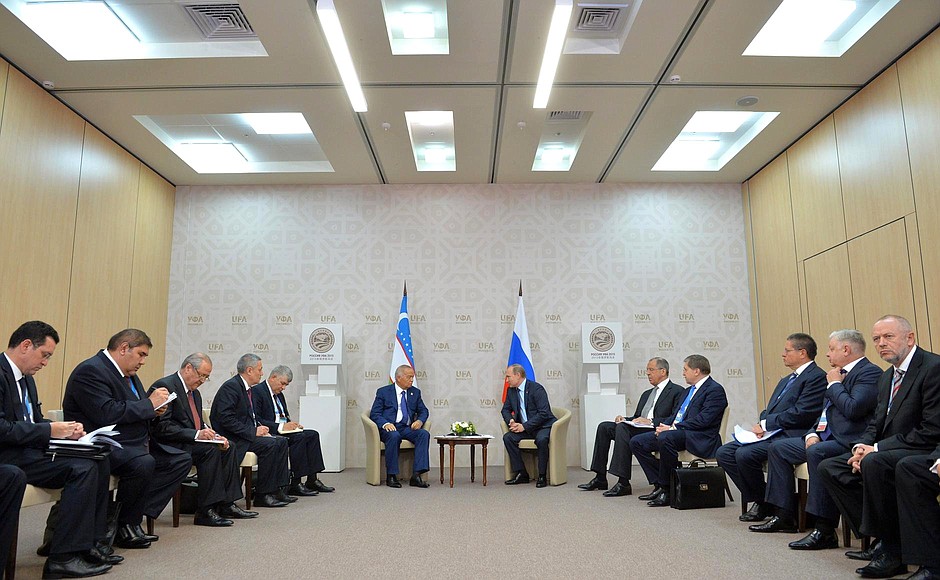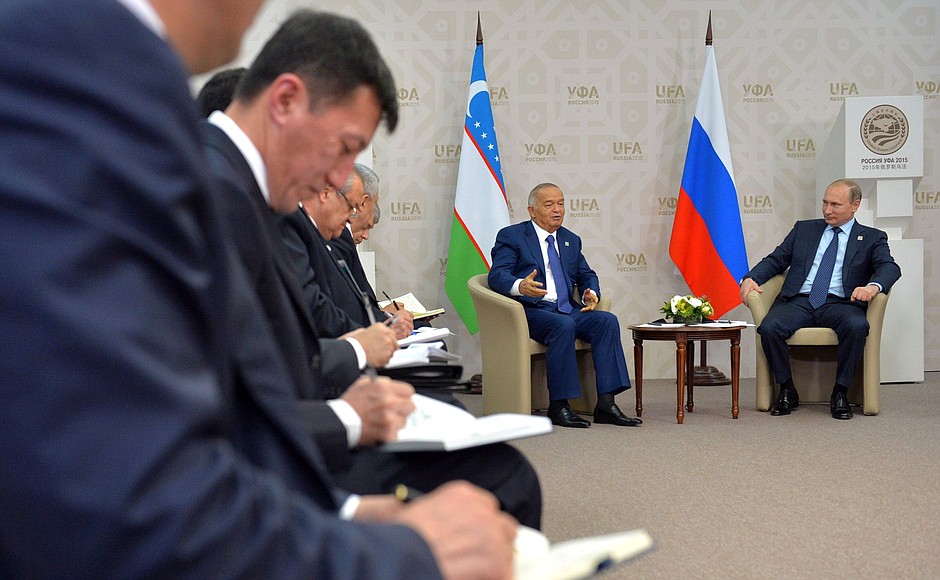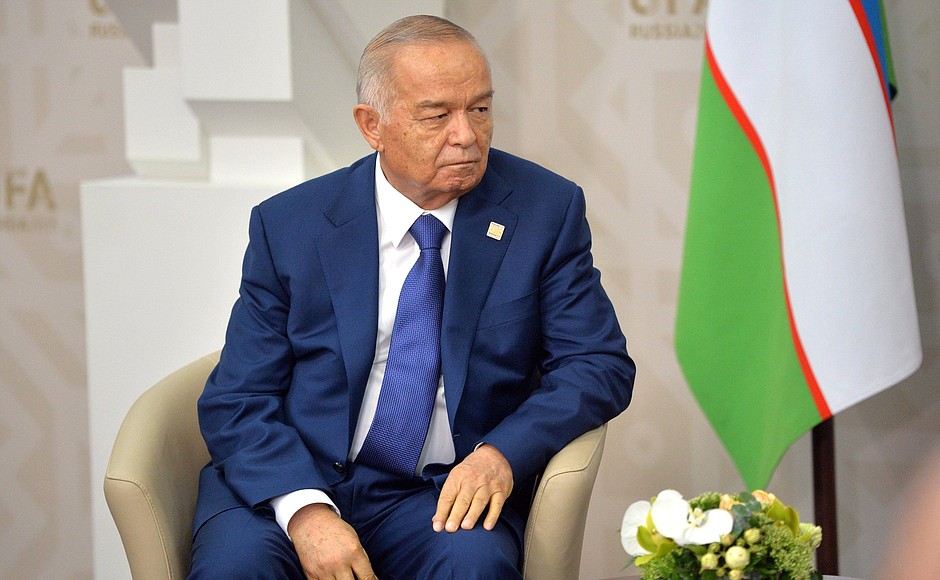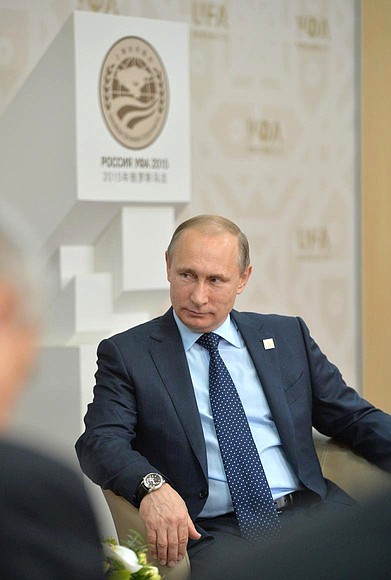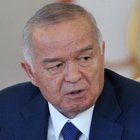The two presidents exchanged views on a broad range of issues regarding development of the bilateral partnership in trade and the economy and in cultural and humanitarian areas. They also discussed key regional security issues.
Mr Putin also invited Mr Karimov to make a state visit to Russia.
* * *
President of Russia Vladimir Putin: Mr President, friends, let me welcome you once again to Ufa.
Mr President, this year, we are marking the 10th anniversary of the agreement on an alliance, and in this respect, I note that it has been a long time since you made a state visit to Russia. We meet regularly and keep up our contacts, and you do come to Russia often, but the formal diplomatic side of things has its own significance, and I therefore want to invite you to make a state visit to Russia.
I note that our relations are developing very well. Russia remains solidly established as one of Uzbekistan’s biggest trade and economic partners. We use different methods for calculating our trade. According to our statistics, our bilateral trade came to around $4 billion last year, and according to your statistics, around as much $6 billion, including gas transit. In any case, these are solid figures, especially considering that Russian companies have invested a total of $6 billion in Uzbekistan’s economy.
Regarding our cooperation on the international stage, we are working together very productively. We work together actively on integration projects in the post-Soviet space, above all the CIS, and we also have cooperation within organisations such as the Shanghai Cooperation Organisation. Uzbekistan is now about to take over the presidency in this influential international organisation.
I am very pleased to see you and have this chance to discuss our bilateral relations.
President of Uzbekistan Islam Karimov: Thank you, Mr President.
First of all, your invitation for me to make a state visit later this year comes as a complete surprise. Not only does this make me happy, I think it is something that would be very beneficial.
Many different processes are taking place in the world today. Our views might differ on this or that matter, but journalists and the media world in general sometimes take these differences to the extreme, I would say.
Faced with someone representing the opposing point of view, the task seems to be to get them in such a state and put them in such a light as to make it clear who is in which camp. I completely oppose this kind of approach because it is absolutely wrong with regard to Uzbekistan.
Let me take this opportunity to say here in this friendly setting that we do not and will not let this happen. I want to make it clear to everyone interested in this subject: we have common interests, a common life, and common trials that we have gone through together with Russia and the Russian people.
I think that these events and trials have not only bound us closely together, but have given us a common future too, and we must not forget this, no matter what our differences with particular Russian officials or government representatives. This is always clear in my mind. Yes, we live in a difficult age, the world is changing very fast, and relations are changing too. Everything is changing fast, and relations between countries and people are becoming more ambiguous. Common interests are therefore the most important thing of all, and the rest is all relations that develop under the influence of a wide variety of circumstances.
To say that this is constant opposition to or somehow against Russia’s policies is really quite absurd. I am therefore always happy to see you, Mr Putin, in Moscow, in other cities, or here in Ufa today.
Ufa is a modern city with its own ethnic colouring. I envy your towns and regions that have the opportunity to host this or that big conference or gathering.
We had what we called a meeting yesterday, and today are holding a session of the SCO. I want to repeat now what I said yesterday, when the journalists were not present. I said that yesterday’s meeting was an unusual and I would say unique event in itself. When representatives of four continents get together, this is not simply a unique meeting but it is an event that only Vladimir Putin could organise. I am convinced that what I say is right here, because for this, it is not enough to be a leader, you also need to be a great diplomat. I want to congratulate you on this achievement.
Perhaps you do not bear the title of plenipotentiary and extraordinary ambassador, but I think, Mr Putin, that you could surpass any diplomat, and I think that Mr Lavrov [Russian Foreign Minister] would agree.
What do I mean by this? Relations between Uzbekistan and Russia (in connection with new assessments of the cost of gas supplies and other factors) may vary of course, but it is clear that overall they are on an upward curve. Our economic relations are fully comprehensible. I must say that there is a lot of potential for increasing these ties. I think that the enormous unused opportunities we possess and meetings such as the one today will certainly help us to settle all of these issues as soon as possible.
Coming back to today’s summit, I must say that there are still many questions and I hope to hears your answers to them. Only you can give me clear and direct answers to the difficult questions that arise in connection with Uzbekistan’s Presidency of the SCO in the coming year.
The discussions have just begun, as the diplomats say, on the accession of new members to the organisation. Some are already saying that we have two new members joining, but let us not forget just who these two new members are in terms of human potential, military and technical capability, and many other criteria. India, for example, ranks third in the world according to some economic indicators, and Pakistan too, is a country of around 300 million people. In other words, it is a country that will play an independent role. My first questions to you are therefore of a practical nature.
If we have started discussing these countries’ accession, the country that has just taken over the organisation’s presidency faces the question: how will the discussions and the accession procedure be organised, and how long will it take, keeping in mind too that these are not ordinary countries, but nuclear powers.
Seen from this angle, these two countries’ accession to the SCO will not just change the political map [of the world], but, I think, could also change the balance of power. This is therefore not such a straightforward event. I think we need to consult with each other on this matter.
I think that the two great powers that are Russia and China should play a decisive part here, because it is easier for them to discuss the issue and understand its complicated nature and potential manageability, given the uncertainties involved.
Vladimir Putin: How would this look: President Karimov of Uzbekistan brought India and Pakistan into the SCO and created a new political reality in the world. Let’s talk about this.
Islam Karimov: Yes, I think this could be the subject for a private conversation. There are already enough people around eager to give their view.
<…>
